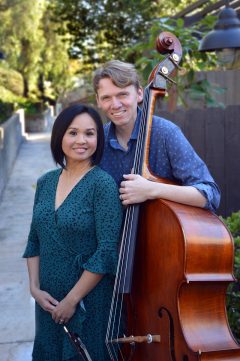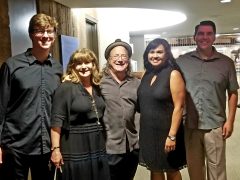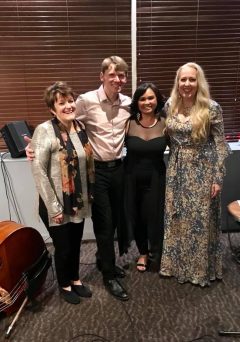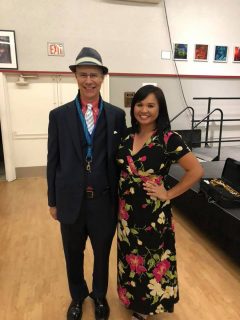Cover Story
Justin and Melonie Grinnell: A Fine Romance
Being a jazz musician can be hard on your romantic relationships. Dating, let alone marrying a musician is no picnic and, in the tradition of Valentines Day, I salute anyone who has had the guts to even try. People who make it work have earned my highest respect.
Relationships between two musicians seem doubly fraught—but when they work, I think we all applaud. When two performers decide to tie the knot, I often say a silent prayer for them. Making the decision to start a family is the ultimate risk, and there are a lot of us out there who have tried and failed, myself included.
So it is a joy to report that two of San Diego’s finest musicians, bassist Justin Grinnell and pianist Melonie Grinnell seem to have found that precious balance necessary to keep all of those plates spinning, and when I got the opportunity to interview them both for this Valentine’s Day edition of the San Diego Troubadour, I was interested, to say the least, in finding out how they manage it.
I’ve been monitoring Justin’s career for about ten years now, having been initially exposed to his playing through his membership in the Danny Green Trio. Later on, I caught him with the ARC Trio, featuring Rick Helzer on piano and Nathan Hubbard on drums. Those two gigs could not be more different from each other, and the ability to thrive in both situations is somewhat akin to the situation Gary Peacock conquered in 1963 when he starred in a trio with Bill Evans on piano while simultaneously blazing a new archetype as a member of Albert Ayler’s group—meaning that Justin has range.
I came into contact with Melonie’s work much later, although I’d heard stories about her innate musicianship for years. She seemed to be content with maintaining a busy academic schedule by teaching at Grossmont College, where she recently earned a tenured position.
But a few years ago, the criminally underrated composer Joe Garrison changed all of that for me. Garrison drafted Melonie for his large chamber ensemble, Night People, and through several albums and live performances I was able to experience her talent up close in a highly demanding situation. She can apparently read the most dense charts with ease, then improvise with astonishing facility, blurring the distinction between what is on the page and what is in the imagination.
To make a long story short, these two are among the finest musicians in Southern California and, as I was to discover on a typically perfect January day in North Park, two of the nicest and most sincere folks that I have had the opportunity to commune with.
I would love to talk about Melonie. She brings so much more than you can imagine. She’s a force of nature and a fantastic musician. She has an ear that is unmatchable. There is an inner power that she is able to summon at will. She should be a bandleader.
She can cover the entire spectrum, she can read anything, think on her feet, and solo with the best of them. She demands to know where I’m coming from as a composer. Because of her I’ve been able to make breakthroughs. I am extremely grateful to her. She is fearless and the ultimate collaborator. I cannot say enough about her, except
that she is a fantastic musician.
—Joe Garrison
THE INTERVIEW: MUSIC IN THE HOUSE
San Diego Troubadour: What was your first musical memory?
Justin Grinnell: “Well, my first instrument that I took lessons on was the alto saxophone. I think maybe my mom picked it out for me because my grandfather was a professional wind player in New York. My sister Laurel is also a musician, and there’s an old picture of us playing on our lawn. She with a flute [she plays drums now] and me with my sax. It was definitely a musical family—my mom played guitar and piano and her sister played piano as well.”
Melonie Grinnell: “My first memory was playing a piano recital when I was four years old. I didn’t understand why everyone was clapping, but I liked it. My family was not formally trained, but most Filipino families are musically inclined. My mom can sing really well and she can whistle really well. She has absolute pitch, which is where I think I got it from.”
Justin: “Sitting here talking, I now recall that we had a piano in our house as well, and my sister and I used to jam out on it all the time, way before I started studying the saxophone.”
So, both of you were trained in music, right?
Justin: “I took lessons and learned how to read music and played in school, but I wasn’t super into it. I probably got by with the minimal effort. I mostly played in school. My mom tried to hook me up with private sax lessons but I don’t remember that going so well.”
Melonie: “The first recital came about through my piano teacher. I started taking lessons because a friend of mine was doing it. But my mom says that I was the kind of kid who would always gravitate to the piano whenever we went to the store. I was that annoying kid that wouldn’t stop banging on the piano.”
Melonie, how long did the formal training with that first teacher last?
Melonie: “Well, I was born in Virginia and I always think that if we had stayed there, I would have ended up as a classical musician. But my dad was in the military and we moved out here when I was seven years old. So, this is home for me. I got a new teacher when I moved here and he was more versatile. He mostly taught choir at Southwestern College and did musical theater, so I picked up those skills from him. I think that’s how I’ve been able to make a livelihood out of music. His name was Alan P. Willy, he took me under his wing. I started playing organ at his church and accompanying vocalists and playing for choirs,”
Justin is one of my favorite low-end gurus! He’s got this great sound, great feel, he reads through complex charts with precision, solos beautifully through the changes—all of this executed with an infectious, positive attitude. Plus he can funk it up on the electric bass when the situation comes up. He’s one of the best!
—Peter Sprague
GROWING UP AND MOVING TOWARD EACH OTHER
When did the bass become your instrument of choice?
Justin: “When I was in sixth grade, I had switched from alto to tenor [saxophone], and I propositioned my mom to buy me a baritone and suggested that I would quit if I didn’t get one. In retrospect I guess I was gravitating toward the low-end. But she resisted and by seventh grade I had quit the sax and entered what I call my hiphop/deejay phase [laughter all around]. I bought some equipment and I even had my own deejay name. I was J.G. Smooth [more laughter]. So I did that for a few years. Music was still important to me, especially rhythm section stuff. I saw an electric bass in the Sears catalog, of all places, and I asked my mom to buy it. I don’t know why I didn’t think of it at the time, but she used to work for the Alembic Company [a very high-end bass manufacturer]. The owners of Alembic were my godparents. So my mom surprised me with an Alembic and I started playing that in high school.”
Were you studious in high school, were you one of the “cool kids”?
Justin: “I had a close group of friends and we hung out a lot. It was a good experience for me. I didn’t get in any trouble and I got fairly good grades while still having fun.”
Melonie: “High school was awkward. No one really knew that I was a musician. I was very focused and studious. I got very good grades.
I went to Morse High School in Southeast San Diego, and I was the stereotypical Asian student.”
When did jazz, and the upright bass become a thing for you?
Justin: “I was always the kind of bass player that didn’t like playing the same bass line twice. After high school I went to a junior college that was literally right next door. I was playing in the jazz band sitting next to an upright player and I was blown away by the sound. I hunted one down and started taking lessons from a bassist in the Santa Rosa symphony.”
What did you do first after high school?
Melonie: “I went to San Diego State as a business major for two years, because my mom didn’t think music was a viable career. While I was there, some friends were taking music classes at Southwestern College and they needed an accompanist. So, I went there as an hourly, paid employee and I was still making money on the side so I started to realize that a career was possible. So I took two years of theory at Southwestern College, and then I went to the University of Miami for two years where I got my B.A. It was a great experience. I was like the smallest fish in that pond.”
And how did you end up in San Diego, Justin?
“I had a couple of friends in Santa Rosa who I was close with. We all wanted to transfer together and get a place. I actually transferred as a math major, but when I look back on my records, my first semester was all music classes. Pretty soon I realized that people in San Diego were making a living playing music in San Diego, which I had never seen in Santa Rosa. I was in my early twenties, it was 1999 and I started over. I switched majors and stuck with it right through my master’s degree in 2005.”
What did you learn at San Diego State that stays with you?
Justin: “That list keeps growing every day. I just wanted to play in a combo at first, but every professional experience I’ve ever had benefits from what I learned there. The theory and combo classes with Rick Helzer and the traveling experience with Bill Yeager.”
Melonie, what did you do after you graduated from the University of Miami?
Melonie: “I was still pretty insecure about my skills as a jazz pianist at the time. A lot of my peers and colleagues were getting scooped up by Julio Iglesias and Miami Sound Machine. I jumped on a cruise ship and I was really lucky to be playing with a top notch band. I think I learned a lot. Of course I was always the only girl in the band, but I wasn’t always the greenest player. I learned how to play charts to support the headliners that came on the ship. After a year, I got promoted to musical director where I was conducting from the piano and I did the cruise ship thing for about three years. I worked for Carnival and Royal Caribbean until I got tired of living out of a suitcase. So I came back home in 1999 and I called my mentor at Southwestern College [Dr. Terry Russell] and asked her if she had any work for me, and she asked me to come and teach piano, and that’s how I got my foot in the door. Then they told me, ‘If you want to stick around, you need to get your master’s degree.’ So I went back to San Diego State.”
So you guys met around that time?
Justin: “Yeah Melonie came here to get her master’s and I was still in the middle of getting my Bachelor’s. The first time I saw her was in a big-band rehearsal. Dave Pschaida was the drummer and he became a close friend to both of us. He kind of egged me on, like ‘let’s go meet the new girl.’ And I pretty much didn’t stop bothering her after that.”
She’s a versatile musician in both classical music and jazz, and is one of the most gifted and self-effacing musicians I know. I recommended her to Joe Garrison for his ensemble Night People. Joe’s compositions can be difficult to master and perform, mainly because of his use of odd meters and disjointed melodies coupled with wide-open sections for improvisation and self-expression. Because of her outstanding reading skills, overall technical facility, musical depth, and experience, Melonie fit in effortlessly—it was a joy to witness.
—Lori Bell
GETTING TO KNOW YOU…
So was it love at first sight for both of you?
Melonie: “I wasn’t even looking at the time. I had a boyfriend in Newfoundland. Plus he’s five years younger than me, straight from Northern California with the long hair and the ponytail. I was already teaching adjunct at Grossmont and Southwestern. I’m just trying to further my career but he kind of got to me by being very sarcastic.”
Justin: “Sometimes it works.”
How long did it take you to ask her on a date?
Justin: “Not too long. Maybe a couple of months. We had to hang out together first. I offered my services as a bass player for a recital she was playing.”
Melonie, when did you start to think maybe this guy is kind of cute after all?
Melonie: “It’s funny because Derek Cannon reminds me that I would come to him and say that I can’t get that bass player out of my head. That was like 2001”
So, how long did you date before you tied the knot?
Melonie: “He made me wait like six years…”
What was up with that, Justin?
Justin: “It’s hard to explain. We’ve always gotten along really well and it wasn’t like there was any conflict or anything. It was mostly a matter of timing for me. I needed to be in a place where I felt a sense of job security, you know, that I could help support a family. I definitely did not have any of that while I was pursuing my master’s degree. Afterward, I started getting teaching gigs and playing shows around town through the union.”
During that six years of dating, did you guys know this was the real thing. Were you planning for a future together?
Melonie: “That was definitely the plan. We got married 11 years ago. I am five years older than Justin so the biological clock was ticking. We had our first son, Brady, when I was 36. Our second son Owen came two and a half years later.”
You both perform, you both teach, and you have two kids. How do you balance all of that?
Justin: “One of our strengths is we know each other’s line of work. So there is a lot of mutual support. If I’ve got a gig she wants to help and vice versa. When she’s teaching, I’m watching the kids or dropping them at school. Between teaching and the music biz, our schedules are always changing and we have to be flexible”
How has being a parent changed your lives?
Justin: “It does change everything. And it has reminded me how getting kids started on an instrument can be fun. It has also changed the way I perform. Melonie and I have both volunteered for the classes our sons are in, and just doing that changes the way you present yourself. It is different than being in a jazz club. When you’re playing for kids, what you do and how you perform and what is important is different. That knowledge has informed the way I approach music a lot.”
I can see you’re getting a little emotional. Are you okay with answering the same question?
Melonie: “I had two very difficult pregnancies. Our first child, Brady, was a micro-preemie. He was born one pound, 10 ounces. It was 10 years ago and I’m still emotional. He was a miracle. Our second child wanted to come out really early too, just because my body didn’t want to hold the babies. But to answer the question, I feel things deeper and with more emotion than before. Before I had kids I was a technical player, and mastery was the goal. It’s different, it’s deeper now. “
You mentioned your kids and music. What instruments are they playing?
Melonie: “They both are very musical. Both of them play the piano and both of them love playing the melodica. Brady also plays the viola. They are both in the Yamaha piano school and have absolute pitch.”
HIGH-PROFILE GIGS
Back to music: Justin, tell me what it’s like playing with Peter Sprague?
Justin: “It’s the best. He’s one of the finest musicians ever. I fell in love with his music when I moved to San Diego. Seeing him perform was always great. Some of the first shows I played with him were tributes to Pat Metheny. I got to play with Leonard Patton and Duncan Moore through him. It’s been such a challenge to try and play up to their level. He’s always been an inspiration to me, not only as a musician but as a person. There is some wisdom there that I hope to pick up from hanging out with him.”
Melonie, I have been really excited to see and hear you playing with Joe Garrison. What is that like?
Melonie: “Joe is such an amazing human being. When I first got there I felt like I was trying to fill some big shoes because Lynn Willard had been there before me. I thought I was a good reader before I took the gig, but I had to count everything! That’s what I love about Joe’s music—even if I don’t grab it right away. He has a way of bringing stuff out of his players that they didn’t know was there. But he knows it was there. It’s such an incredible feeling to play in his group because I always feel like I’m brought to another realm. It’s a good feeling. Because of his music, when I go back to playing straight-ahead or funk/groove stuff I can play it even better.”
I met Justin in 2000 when he first moved to town, he joined Return to One for our last year of performances, and we played together in my groups: Skeleton Key Orchestra, Something Strange Is Afoot, Translation Has Failed. We formed ARC Trio with our mentor and hero Rick Helzer, did a million jazz/improv gigs, and even did a few gigs as a duo. We used to rehearse just the two of us with a metronome, deciding on where we wanted to place the time, like tree branches overlapping. Times change and the years pass quickly, we rarely get a chance to play these days, but it has been a pleasure to watch him grow into a first call bassist and integral part of the music community.
—Nathan Hubbard
WHAT’S AHEAD?
Let’s pretend we have a crystal ball here. What do each of you hope that ball reveals for the future?
Melonie: “I’m tenured faculty now, and I love where I teach. I’m just going to put it out there: we want to be homeowners. We live in a condo now where we can’t even play after 6 p.m. We have to use headphones after that. We have a drum set that no one can touch because it’s too loud. The kids really want to mess around with all these instruments.”
Justin, what are your musical plans for the future?
Justin: “I just try to keep an open mind. I hope to do more with Peter Sprague—that’s been going on for 15 years, and I’ve also been with the Danny Green Trio for 10 years. We already have a bunch of things in the calendar for the next few years that look like a lot of fun, traveling around the country, doing performances and master classes.
“I want to do some more of my own projects. I’m always writing stuff, it’s just kind of slow going with being a daddy and teaching and stuff, the composing doesn’t come that fast for me. I’d love to put out a project with my quintet featuring Derek Cannon, Tripp Sprague, Melonie, and Richard Sellers.”
Okay, last question: how do you guys keep the romance happening?
Justin: “We’ve been lucky enough to do some traveling. That’s been really fun. We went to Maui and we went to the Philippines and we do have date nights for sure.”
Melonie: “And my parents live in town, so we’re lucky that way…”
Justin: “We got to see Paul McCartney last time. That was fun…”













